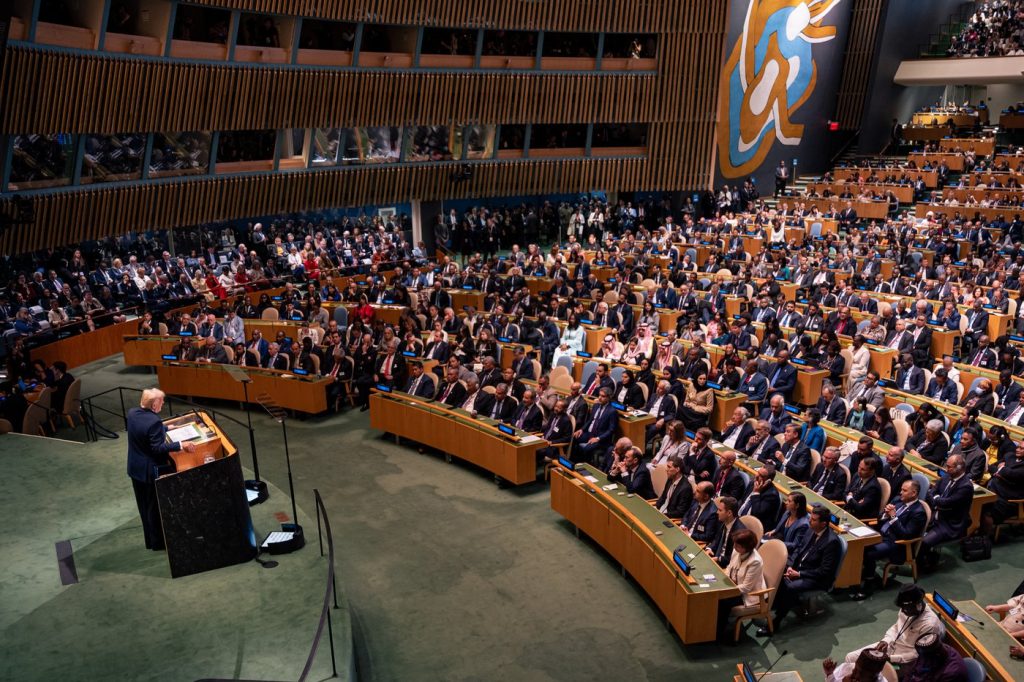In a recent speech at the United Nations General Assembly, President Donald Trump highlighted his administration's diplomatic efforts aimed at resolving several global conflicts, claiming that he had ended what he termed "seven unendable wars" within seven months. This assertion has raised eyebrows, as experts argue that Trump's impact on these conflicts may not be as clear-cut as he implies.
One of the key conflicts Trump mentioned is between Israel and Iran. In June, tensions flared as Israel conducted attacks on Iranian nuclear sites to halt what it perceived as Iran's ambition to develop nuclear weapons. Following these attacks, Trump reportedly negotiated a ceasefire, which was characterized by experts as a temporary respite rather than a complete resolution to the ongoing cold war between the two nations. Evelyn Farkas from Arizona State University's McCain Institute acknowledged that Trump's involvement contributed to the ceasefire but warned that the potential for renewed conflict remains if Iran resumes its nuclear weapons program.
Similarly, Trump's attempts to mediate tensions between Egypt and Ethiopia over the Grand Ethiopian Renaissance Dam have also been met with skepticism. While Trump had worked on brokering a deal during his first term, negotiations have stalled, and the dispute endures. Lawrence Haas of the American Foreign Policy Council noted that describing the situation as a war would be a gross exaggeration, as actual conflict has not erupted between the countries despite ongoing tensions.
The situation between India and Pakistan, marked by recent violence in Indian-controlled Kashmir, led to a ceasefire that Trump claimed was facilitated by U.S. intervention. However, India has denied any trade discussions with the U.S. related to the ceasefire. Experts like Haas and Farkas acknowledge that while Trump's role was constructive, it may not have been decisive in stopping hostilities.
In particular, the U.S. has taken an active role in the conflicts involving Serbia and Kosovo, with claims of negotiating peace deals. However, tensions between these nations, stemming from Kosovo's 2008 declaration of independence from Serbia, have not escalated into war due to NATO's presence in the region. Though Trump facilitated dialogue during his first term, little of the agreed-upon measures have been effectively implemented.
Moving to Africa, Trump's administration has been involved in facilitating discussions between Rwanda and the Democratic Republic of the Congo (DRC). A peace deal was signed in June 2023, yet the conflict, exacerbated by the M23 rebel group, continues to threaten stability in the region. While the Congolese and Rwandan foreign ministers signed the agreement in Washington, it did not directly address the concerns of the M23 group, which refused to comply with terms that excluded their input.
Additionally, the southern Caucasus has seen U.S. involvement, with Trump hosting Armenian and Azerbaijani leaders to sign a deal aimed at concluding their longstanding conflict. Despite initial enthusiasm and praise from both sides, the agreement remains unsigned and lacks substantive follow-through, particularly amid renewed hostilities in September 2023.
Lastly, Trump's influence extended to Southeast Asia, where peace between Cambodia and Thailand was negotiated following a brief border conflict. Both nations engaged in discussions leading to a ceasefire in late July 2023, attributed in part to Trump's leverage over trade negotiations. Analysts suggest that Trump's pressure played a significant role in motivating the leaders of both countries to halt hostilities.
In summary, while Trump's administration has attempted to claim diplomatic victories in various global conflicts, the extent of his influence remains a topic of debate among experts, with many concluding that the situations often reflect ongoing tensions rather than complete resolutions.











